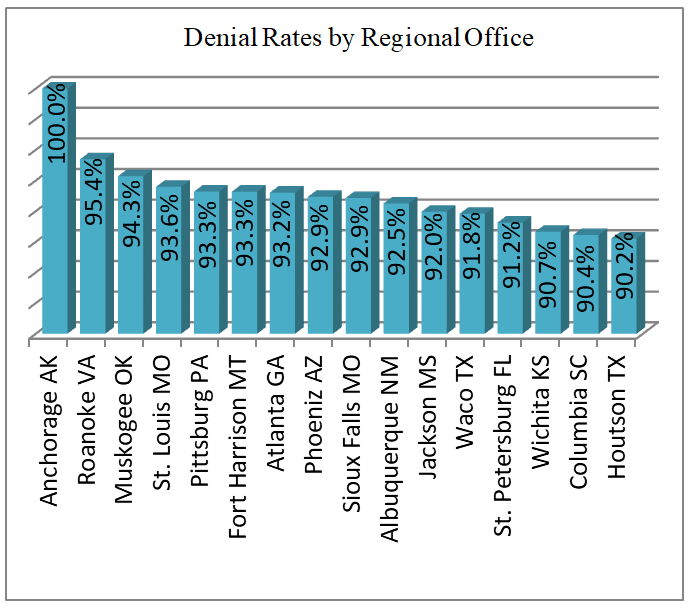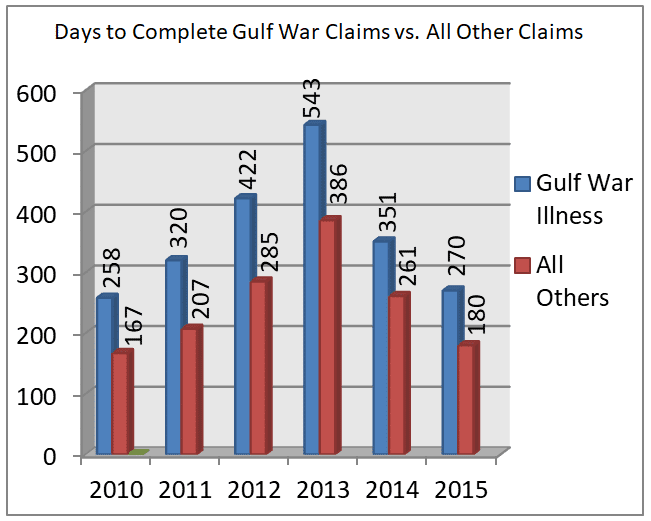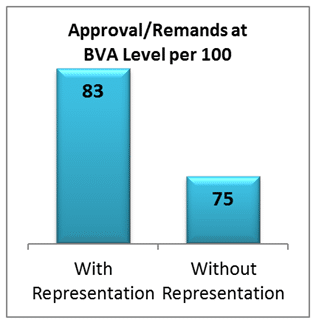When a veteran files a claim, he or she assumes that the laws and processes the VA governs itself by are uniform across the country. After all, other federal laws are relatively uniform across the land. While there are slight variations of interpretation from one circuit court to another, unless that interpretation varies greatly, they are usually close interpretations based on the communities they serve. However, this is not the case with VA law. How each regional office interprets the laws they are governed by has a huge effect on whether veterans are awarded their benefits.

The VA Has very standardized sets of rules on how it processes claims. It also has regulations on how to interpret evidence to decide claims. Again, each regional office interprets these regulations differently. Gulf War vets are also waiting longer than other veterans for decisions, an average of 90 days longer.
What is the Problem?
Many decision makers at the Regional Office level are not educated well enough on the unique medical intricacies that Gulf War veterans face. Even most of the doctors working within the VA system conducting C&P exams are not specialized enough to understand some of the complexities. There are two main claims for Gulf War veterans that differ from any other type of veteran. These are Medically Unexplained Chronic Multisymptom Illnesses and Undiagnosed Illnesses. What are these conditions and how can veteran’s better prepare their claims in an attempt to reduce their chance of denial and wait times?
Medically Unexplained Chronic Multisymptom Illnesses (aka Gulf War Syndrome)
Most medical conditions have an etiology. An etiology is what causes the condition. The idea of medical treatment is to find the cause of the illness or condition and remove the cause, thereby removing the illness or condition. If someone has cancer, we attempt to remove the cancer cells. If someone has Hepatitis, we attempt to kill the virus. With many illnesses seen in Gulf War veterans, there is no identifiable cause for the illness. Many Gulf War veterans experience headaches, fatigue, joint pain, memory problems, insomnia, dizziness, respiratory disorders, and other chronic symptoms that have no explainable reason to exist. They do not have neurological problems, respiratory diseases, or any other identifiable etiology for these symptoms. Unfortunately, when a person goes into a doctor’s office complaining of symptoms that the doctor cannot find cause for, they are usually brushed aside as either making up their symptoms or exaggerating. However, these symptoms are real and veterans suffer.
Undiagnosed Illnesses
Undiagnosed illnesses are just that, illnesses that doctors cannot diagnose. The VA is very good at listing on a rating decision that the reason for denial is that the veteran has not been diagnosed with a condition. Well, of course, in this case, they should be approved for that exact thing. Again, the VA does not always follow their own rules. Veterans of the Gulf War often experience things such as weight loss, fatigue, cardiovascular diseases, muscle and joint pains, headaches, menstrual disorders, neurological and psychological disorders, skin conditions, respiratory disorders, and sleep disturbances that do not fit into any currently known diagnostic categories. These are undiagnosed illnesses and as long as there is medical evidence that the veteran is experiencing symptoms that are undiagnosed and is being treated for them, then the VA should not deny these types of claims based on the veteran not having a diagnosis.
What Can Veterans Do?
There are several ways a veteran overcome these inconsistencies within the VA system. Following a plan and having guidance is crucial to reducing wait time and increasing the chances of a claim or an appeal being approved.
- Ensure your documentation is in order. Make sure that you have medical documentation showing symptoms, treatment of those symptoms, a doctor’s statement to the lack of diagnosis if filing for an undiagnosed illness, and, if possible, a nexus statement from your treating physician linking your symptoms to your service in the Gulf War.
- Providing proof of service. Ensure that you provide any proof of service in Southwest Asia and, if applicable, any lay evidence or statements that support any possible exposures to toxins such as burn pits, biological or chemical weapons (hearing alarms going off, being ordered to wear gas masks or hazard suits), etc.
Getting professional advice. If you are filing an initial claim, seek out the assistance of a Veteran’s Service Organization with a proven track record. If you are appealing a decision, either a denial, an effective date that is later than you feel is correct, or a lower rating that you feel you deserved, call an attorney that specializes in VA law. While attorneys do cost money, veterans who do not use attorneys are denied at the BVA appeal level 32% more often than with attorney representation. An attorney can also help with secondary claims, increased ratings, and earlier effective dates that can result in higher payments that many veterans can realize on their own, more than making up for the cost.

 Getting professional advice. If you are filing an initial claim, seek out the assistance of a Veteran’s Service Organization with a proven track record. If you are appealing a decision, either a denial, an effective date that is later than you feel is correct, or a lower rating that you feel you deserved, call an attorney that specializes in VA law. While attorneys do cost money, veterans who do not use attorneys are denied at the BVA appeal level 32% more often than with attorney representation. An attorney can also help with secondary claims, increased ratings, and earlier effective dates that can result in higher payments that many veterans can realize on their own, more than making up for the cost.
Getting professional advice. If you are filing an initial claim, seek out the assistance of a Veteran’s Service Organization with a proven track record. If you are appealing a decision, either a denial, an effective date that is later than you feel is correct, or a lower rating that you feel you deserved, call an attorney that specializes in VA law. While attorneys do cost money, veterans who do not use attorneys are denied at the BVA appeal level 32% more often than with attorney representation. An attorney can also help with secondary claims, increased ratings, and earlier effective dates that can result in higher payments that many veterans can realize on their own, more than making up for the cost.

